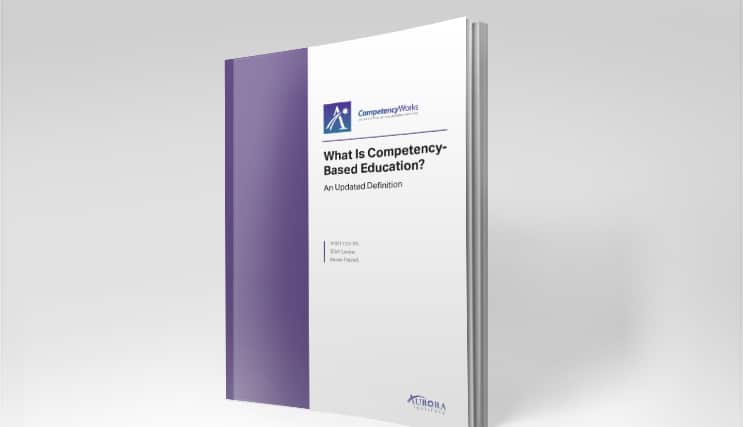Press Release
A New Definition of Competency-Based Education for K-12 Education Transformation

WASHINGTON, D.C. (November 14, 2019) — Eight years after releasing the field’s first working definition of competency-based education, CompetencyWorks (at the Aurora Institute, formerly iNACOL, @Aurora_Inst) has expanded the definition to reflect deepened understanding in the field and address the challenges of implementing student-centered learning models in K-12 education.
Competency-based education, as defined by the field’s leading experts, now has seven elements. The working definition developed in 2011 had five components. The revised and updated components express the field’s greater understanding of the essential nature of student agency in building student motivation, engagement, lifelong learning skills, and depth of knowledge.
The new definition of competency-based education is:
- Students are empowered daily to make important decisions about their learning experiences, how they will create and apply knowledge, and how they will demonstrate their learning.
- Assessment is a meaningful, positive, and empowering learning experience for students that yields timely, relevant, and actionable evidence.
- Students receive timely, differentiated support based on their individual learning needs.
- Students progress based on evidence of mastery, not seat time.
- Students learn actively using different pathways and varied pacing.
- Strategies to ensure equity for all students are embedded in the culture, structure, and pedagogy of schools and education systems.
- Rigorous, common expectations for learning (knowledge, skills, and dispositions) are explicit, transparent, measurable, and transferable.
“Competency-based education is being implemented at deeper levels in more districts and schools every year,” said Susan Patrick, President and CEO of the Aurora Institute. “Competency-based education describes a system that differs from the traditional one-size-fits-all education system and focuses on all students achieving mastery. This report is designed to support a wide variety of stakeholders—school leaders, practitioners, and policymakers—who will translate this updated definition into action to create high-quality education systems on behalf of our nation’s schoolchildren. As a field, we prioritize defining our terms and communicating clearly about this work because of its impact on implementing with quality and fidelity to ensure students build the knowledge and skills needed for success. Our ultimate goal is whole-system transformation of K-12 education.”
Competency-based education seeks to transform teaching and learning in the nation’s elementary, middle, and high schools. It is a major shift in school culture, organization, structures, and pedagogy. It challenges and deconstructs the traditional, time-based, one-size-fits-all approach to public education, which has changed very little since its Industrial Age beginnings.
In a traditional setting, students move from one grade to the next based on time with variable amounts of learning. In contrast, competency-based systems set clear and transparent learning goals, hold all students to achieve mastery before moving to the next level, make assessments meaningful for educators and learners, and respond to community desires for what graduates ought to know and be able to do. Competency-based education systems also enable more personalized approaches to teaching and learning. There are multiple paths to demonstrating the knowledge and skills needed. In addition, students receive timely support to ensure they get to the next level of learning.
CompetencyWorks estimates 6-8 percent of school districts in the United States are implementing competency-based education at some level. Each district operates in a different socio-political environment. Each begins the work at different entry points and starts for different reasons in their respective communities. An overarching definition, therefore, is critical to unify the field, level-set community expectations, and challenge the unfortunate misconceptions that come with innovation. In addition, policymakers, whose work untethers schools from restrictive rules, need specific language to codify the definition to allow innovation to happen.
“We have the privilege of working with many leaders in the field who have deep insights from coming at this work from many different perspectives and contexts,” said Aurora Institute Research Director Eliot Levine. “Together, we agreed that we needed to expand and improve on the definition and offer supporting materials to help people understand the definition, put it in context, and take action based on where the field is today and what needs to happen next.”
Download a full copy of What Is Competency-Based Education? An Updated Definition here.
About CompetencyWorks
CompetencyWorks is a project of the Aurora Institute. It is a collaborative initiative dedicated to advancing personalized, competency-based education in the K-12 education system. We are deeply grateful for the leadership and support of our advisory board and the partners who helped to launch CompetencyWorks: American Youth Policy Forum, Jobs for the Future, and the National Governors Association. Their vision and creative partnership have been instrumental in the development of CompetencyWorks. Most of all, we thank the tremendous educators across the nation who are transforming state policy and district operations, as well as schools willing to open their doors and share their insights.
About the Aurora Institute
The Aurora Institute’s (formerly iNACOL) drives the transformation of education systems and accelerate the advancement of breakthrough policies and practices to ensure high-quality learning for all. Visit our website, like us on Facebook, and follow us on Twitter.